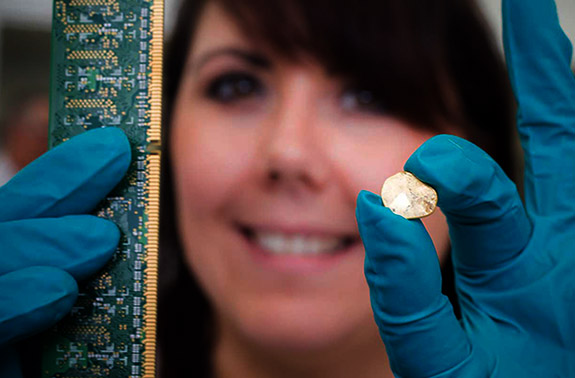The Royal Mint Employs New Method to Extract 99% of Gold From Electronic Waste
Utilizing a patented, transformative technology, The Royal Mint will be able to extract 99% of the precious metals contained within electronic waste – in seconds, at room temperature.

The Canada-based company called Excir is credited with developing the innovative, ethical and sustainable way to separate gold and other precious metals from the circuit boards of discarded laptops, tablets and smart phones.
The Royal Mint will employ the new technology in a first-of-its-kind recovery plant in South Wales. The facility will create a new source of high-quality, sustainably sourced precious metals for The Royal Mint's core products, which include coins and bullion bars.
When fully operational in 2023, The Royal Mint's facility will process up to 90 tons of UK-sourced circuit boards per week – generating hundreds of kilograms of gold per year. Embracing the principles of a circular economy, the plant will be able to process the entire circuit board, helping to reduce the environmental impact of electronic waste and foster new skills and employment in the UK.
Previously, 99% of the UK's circuit boards would be shipped overseas to be processed at high temperatures in smelters.
Commenting of The Royal Mint's initiative, Scott Butler, executive director of Material Focus, told Sky News, "Our research has indicated that if all the unwanted electricals we hoard or throw away every year in the UK were recycled, we'd have enough gold to make over 858,000 rings."
Of the more than 50 million tons of electronic waste that is generated globally each year, less than 20% is currently being recycled. If nothing is done, this number is set to reach 74 million tons by 2030.
“We are transforming our business for the future — expanding into areas which complement our expertise in precious metals, champion sustainability and support employment," said Anne Jessopp, Chief Executive of The Royal Mint. "Our investment in a new plant will see The Royal Mint become a leader in sustainably sourced precious metals and provide the UK with a much-needed domestic solution to the growing problem of electronic waste.”
Credit: Image courtesy of The Royal Mint.

The Canada-based company called Excir is credited with developing the innovative, ethical and sustainable way to separate gold and other precious metals from the circuit boards of discarded laptops, tablets and smart phones.
The Royal Mint will employ the new technology in a first-of-its-kind recovery plant in South Wales. The facility will create a new source of high-quality, sustainably sourced precious metals for The Royal Mint's core products, which include coins and bullion bars.
When fully operational in 2023, The Royal Mint's facility will process up to 90 tons of UK-sourced circuit boards per week – generating hundreds of kilograms of gold per year. Embracing the principles of a circular economy, the plant will be able to process the entire circuit board, helping to reduce the environmental impact of electronic waste and foster new skills and employment in the UK.
Previously, 99% of the UK's circuit boards would be shipped overseas to be processed at high temperatures in smelters.
Commenting of The Royal Mint's initiative, Scott Butler, executive director of Material Focus, told Sky News, "Our research has indicated that if all the unwanted electricals we hoard or throw away every year in the UK were recycled, we'd have enough gold to make over 858,000 rings."
Of the more than 50 million tons of electronic waste that is generated globally each year, less than 20% is currently being recycled. If nothing is done, this number is set to reach 74 million tons by 2030.
“We are transforming our business for the future — expanding into areas which complement our expertise in precious metals, champion sustainability and support employment," said Anne Jessopp, Chief Executive of The Royal Mint. "Our investment in a new plant will see The Royal Mint become a leader in sustainably sourced precious metals and provide the UK with a much-needed domestic solution to the growing problem of electronic waste.”
Credit: Image courtesy of The Royal Mint.

